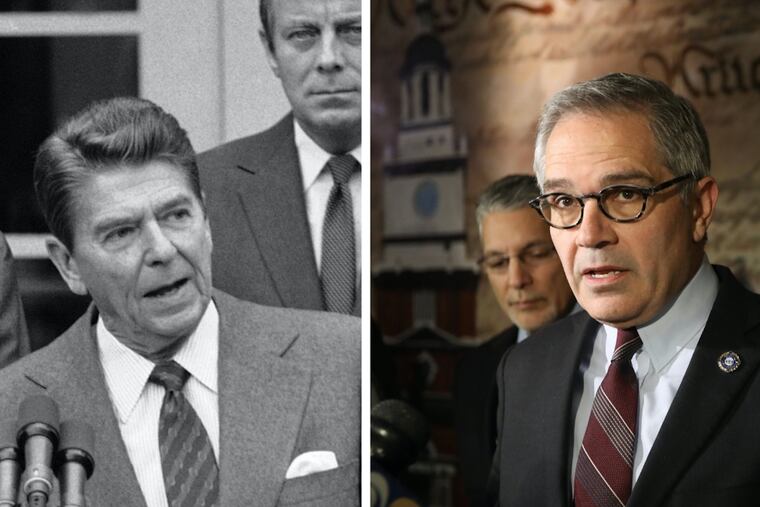DA Krasner should take a page from Reagan’s playbook: Cut budgets to enshrine your legacy | Opinion
Reagan’s budget cuts harmed the poor and people of color. Krasner’s cuts could promote long-lasting justice.

What will be Larry Krasner’s legacy? The nationally recognized progressive prosecutor has already made his mark in Philadelphia. On Wednesday, Krasner shared his accomplishments with City Council during a two-hour budget hearing. Making his case, he talked to progressive supporters by highlighting the social justice aspect of his reforms, to opponents by emphasizing the declining violent crime rate and efforts to investigate cold cases, and to City Council by noting the tremendous cost savings that are associated with less incarceration.
Krasner asked City Council for an additional $3 million — a 7 percent budget increase — that would go primarily toward continued efforts to recruit high-quality hires, DNA testing to solve cold cases and ensure the integrity of old convictions, and an economic crimes unit. “The savings that are generated by simply doing the job better and being really surgical about how you do it are astronomical,” Krasner told Council.
Speaking to Council, Krasner said: “I realize that the work that I’m trying to do is not going to be done before I am gone.” That’s true, and we can’t work under the assumption that Krasner’s successor will be like-minded. Krasner is one gut-wrenching violent crime away a few weeks or months before election from getting the boot. And while Krasner has plenty of time left in his term, it is never too early to prepare for that possibility.
Krasner’s reforms are not set in stone — they are written in policy memos. And just as Krasner took over the office, fired a bunch of prosecutors, and quickly changed policy, a zealot tough-on-crime prosecutor could shred those memos and take the city back in time.
But the progressive-lefty DA can enshrine his reforms by looking at the legacy of a conservative icon — President Ronald Reagan.
From his first days in office in 1981, Reagan started his push to cut taxes and slash social programs. And while Reagan was a self-proclaimed champion of smaller government and reduced government spending, what he really championed was a dramatic shift in priorities and what America spends money on. Donna Murch, an associate professor of history at Rutgers University, told me that although Reagan cut social programs, he gave more money to defense and law enforcement. Since the late 1960s, the federal focus on crime and order — based in racist politics as a pushback to the successes of the Civil Rights Movement — started redefining issues. Murch explains, “things that were thought of as problems of the social, become problems of the criminal.”
Take for example the Community Development Block Grant, a program established under President Gerald Ford in 1974 in order to provide funding for local solutions to social problems. When Reagan took office, the program’s budget was the equivalent of $15 billion in 2016 dollars. When Reagan left office, the CDBG program was slashed to less than $6 billion. Similar trends could be traced in other programs. At the same time, the Justice Department’s budget nearly doubled. CDBG never recovered. Currently its budget is $3.4 billion.
Cutting social services and funneling money to law enforcement didn’t end with Reagan. Republican and Democrat administrations continued this trend. Once budgets are cut, they are really hard to restore. Money gets allocated elsewhere, and lawmakers learn that the program is not sacred, which opens the path for more cuts.
There is a lesson here for Krasner: One of the ways to ensure that a tough-on-crime prosecutor doesn’t reverse his efforts in the future is by slashing the budget of the District Attorney’s Office. Reagan’s budget cuts harmed the poor and people of color. Krasner’s cuts could promote long-lasting justice.
On January 2017, Krasner took over an office that had a budget of $37 million. If he gets the increase he asked for, its budget would be $45 million — a 22 percent increase. Overall, the blueprint of the criminal justice system in Philadelphia — the DA’s Office, police, jails, courts, Public Defender’s Office, Sheriff’s Office — is massive: $1.2 billion of the city’s $5 billion budget.
The DA’s Office is a small part of the city’s overall criminal justice blueprint. But by reducing the size of its budget, Krasner can start a conversation about ending our society’s reliance on institutions built to punish and oppress.
Reagan’s presidency is considered an influential one in part because cutting budgets has long-lasting impacts that are extremely hard to reverse. Ultraconservative activist Grover Norquist once said: “I don’t want to abolish the government. I simply want to reduce it to the size where I can drag it into the bathroom and drown it in the bathtub.”
As long as a progressive is at the helm, having a strong District’s Attorney’s Office can be a positive. But power also can be taken away. If a tough-on-crime prosecutor manages to claim power, a slashed budget from Krasner would land that person in a DA’s Office that we can drown in the bathtub.